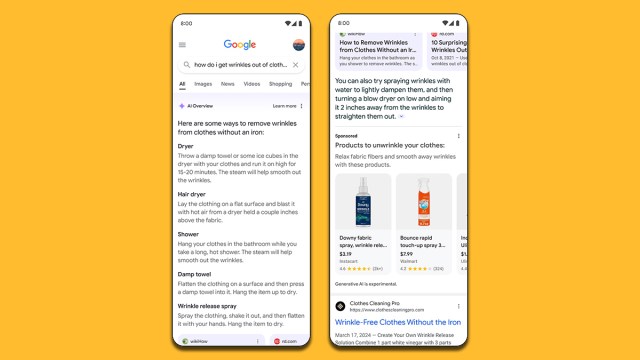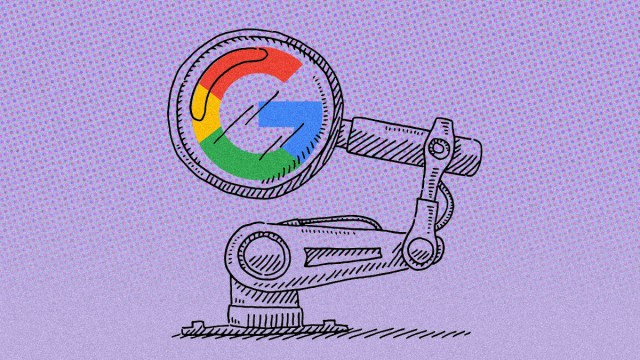Publisher Traffic Spiked Thanks to Google’s Gen AI Overview Tweaks
Drive business and brand growth with winning media strategies at Mediaweek. Hear from experts at TIME, Peloton, YouTube, Google and more, October 29-30 in New York City. Register.
Google’s AI-generated search, AI Overview, is boosting publisher traffic thanks to a new feature that embeds direct links within the text, according to the tech giant, which held a briefing for the press about new features this week. Google stopped short of giving any more specifics about the increase publishers were seeing.
A query asking about ‘the tallest tree in the world’ now includes an in-line link directing users to the Guinness Book of Records. After initial testing in August, Google is expanding this feature across all seven countries where AI overviews are available, including the UK, India, and Japan.
Google, which has held discussions with publishers about AI Overview and the impact on traffic, said this new format is intended to facilitate diverse content discovery while driving more exposure and traffic to websites.
“This improved experience has driven an increase in traffic to supporting websites compared to the previous design,” said Rhiannon Bell, vp, UX, Google. Bell wouldn’t share any more specifics.
On desktop, the links are displayed on the right side of the page within AI Overview, while mobile users can access them by tapping icons or scrolling to the bottom.
Managing publisher impact
Google’s AI search, launched last May, raised concerns about disrupting organic search traffic for publishers, potentially slashing ad revenue by up to $2 billion annually. Raptive—which runs ad sales for titles like Half Baked Harvest, MacRumors and Stereogum—anticipates at least a 50% reduction in search traffic for publishers by 2025. For example, a publisher earning $75,000 annually could see a $37,500 drop in income due to traffic loss, according to Michael Sanchez, co-founder and CEO.
However, for some, the impact has been less severe than expected.
During a recent earnings call, Vivek Shah, CEO of digital media and internet company Ziff Davis, noted when analyzing thousands of queries across its key domains that generate organic search referrals, AI Overviews appeared in only 8% of the key search queries, with 92% of search results pages remaining unaffected.
“We hypothesize—and Google has confirmed—that links within AI overviews see higher click-through rates compared to traditional web listing links,” Shah said during the call.
Ads go live on AI Overviews
Ads are now displayed in AI Overviews, but only when there’s a commercial intent behind the query, Brendon Kraham, vp of search & commerce, Google, told ADWEEK.
For instance, a query on removing grass stains from jeans might feature shopping or traditional text ads placed above or below the AI-generated answer, all labeled as sponsored.
Google announced it was testing this ad format at GML last year. Although Kraham didn’t share how ads are performing, he noted that ads in AI Overviews rely on Google’s standard auction process, triggered by relevant keywords.
Google has been pitching these ads to agencies, explaining that changes in keyword and search term matching allow ads in AI Overviews to be triggered not only by user searches but also by the content generated within the AI Overview itself.
If a search term appears less directly related, but the AI Overview discusses relevant keywords that advertisers are bidding on, their ad could still be featured, according to Andy Goodwin, head of paid search at digital media agency Brainlabs. The agency has yet to test ads in AI Overview.
Ads will be available through broad match and Performance Max, all operating under a single auction system, maintaining similar cost-per-click (CPC) rates to traditional search ad slots, added Goodwin.
AI-organized search results
Google is also introducing AI-organized search results in the U.S., powered by its Gemini model. This is outside of the AI-overview experience.
This update will offer a more curated experience for topics without a single definitive answer—such as recipe ideas or meal planning—by grouping results into categories. The new layout will help people navigate large amounts of information more easily by offering subcategories, such as ingredients, as they scroll. Sponsored links will continue to appear at the top of these pages, with the initial rollout focusing on recipes and dining.
“With AI-organized results, we’re surfacing more diverse content formats from a broader range of sources,” said Bell.
Google also announced its enhancing its visual search capabilities via Lens, introducing new AI-powered video and voice features for English-language queries.
https://www.adweek.com/media/publisher-traffic-spiked-googles-gen-ai-overview/

